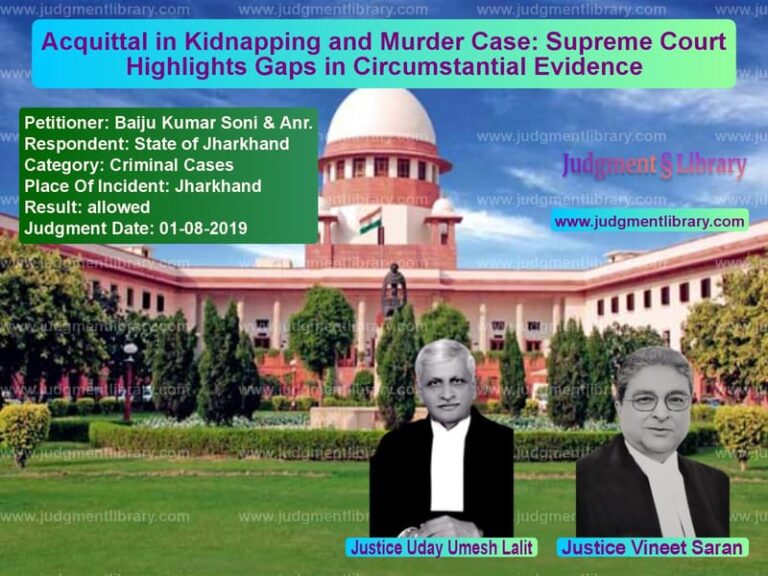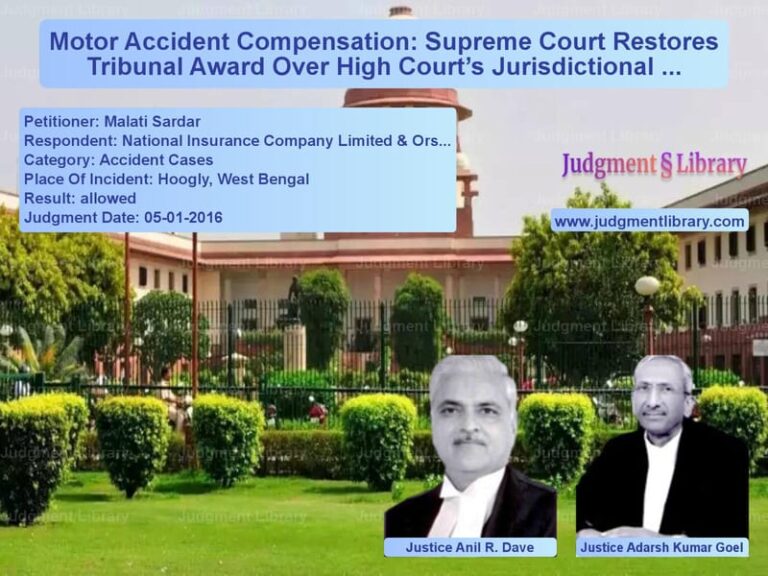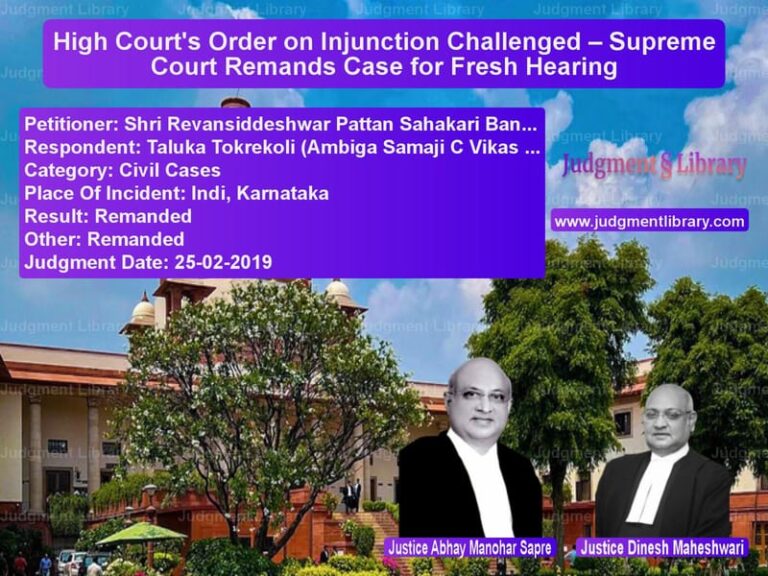Supreme Court Upholds Resolution Professional’s Authority in Corporate Insolvency Case
The Supreme Court of India has dismissed the appeals challenging the authority of a Resolution Professional (RP) in managing corporate debtor assets during the Corporate Insolvency Resolution Process (CIRP). The ruling in Victory Iron Works Ltd. vs. Jitendra Lohia & Anr. upheld the decision of the National Company Law Appellate Tribunal (NCLAT) and confirmed that the development rights of the corporate debtor should be included in the Information Memorandum.
Background of the Case
The dispute centered around a 10.19-acre land parcel in Howrah, West Bengal, which was legally owned by M/s Energy Properties Private Limited but was financially supported by the corporate debtor, Avani Towers Private Limited. Victory Iron Works Ltd. claimed possession of the entire land through a Leave and License Agreement but was granted rights only over a 10,000 sq. ft. portion.
Key events in the case:
- A financial creditor, Sesa International Limited, filed an insolvency petition against Avani Towers Pvt. Ltd., leading to CIRP initiation on October 15, 2019.
- The Committee of Creditors (CoC) was formed, and the RP sought to include the development rights of the corporate debtor in the Information Memorandum.
- Energy Properties and Victory opposed the move, arguing that NCLT lacked jurisdiction to decide property disputes.
- The NCLT ruled in favor of the RP, directing Energy Properties and Victory not to obstruct possession and activities related to CIRP.
- NCLAT upheld NCLT’s ruling while safeguarding Victory’s limited rights under the Leave and License Agreement.
Arguments by the Appellant (Victory Iron Works Ltd. & Energy Properties Pvt. Ltd.)
- The land belonged to Energy Properties, and Avani Towers Pvt. Ltd. (corporate debtor) had no ownership claim.
- Under Section 25(2)(a) of the Insolvency and Bankruptcy Code (IBC), the RP could only take control of the assets owned by the corporate debtor.
- Since Victory was in possession of the land, NCLT lacked jurisdiction to evict a third-party licensee.
- Decisions in Embassy Property Developments Pvt. Ltd. vs. State of Karnataka and Gujarat Urja Vikas Nigam Ltd. vs. Amit Gupta restricted the RP’s powers.
Arguments by the Respondents (Resolution Professional & Committee of Creditors)
- The corporate debtor’s development rights were a valuable asset and must be included in the CIRP process.
- The RP was duty-bound under Section 25 of IBC to protect and preserve all corporate debtor assets.
- The development rights were transferred through legal agreements and financial contributions, making them part of the corporate debtor’s assets.
- The NCLT had jurisdiction over insolvency matters, including the determination of corporate debtor assets.
Supreme Court’s Observations and Ruling
The Supreme Court upheld the decisions of NCLT and NCLAT, affirming the RP’s authority. The key findings were:
- The development rights of the corporate debtor constitute an “asset” under Section 18(f) and Section 25(2)(a) of IBC.
- The RP had the right to take control and custody of all assets recorded in the corporate debtor’s balance sheet.
- The license granted to Victory Iron Works was limited to 10,000 sq. ft., and it could not claim possession over the entire 10.19-acre land.
- The development rights must be included in the Information Memorandum and protected under the CIRP framework.
The Court clarified:
“A bundle of rights and interests were created in favor of the Corporate Debtor, which are valuable assets and must be preserved during the insolvency resolution process.”
Final Judgment
The Supreme Court ruled:
- The Resolution Professional was correct in seeking control over the development rights of the corporate debtor.
- Victory Iron Works Ltd. is entitled only to the 10,000 sq. ft. of land as per the Leave and License Agreement.
- Energy Properties Pvt. Ltd. must cooperate with the RP and the CoC in the CIRP process.
- The appeals by Victory Iron Works Ltd. and Energy Properties Pvt. Ltd. were dismissed.
Implications of the Judgment
The ruling has significant implications:
- Clarity on Corporate Debtor’s Assets: Confirms that development rights acquired through financial transactions are part of the CIRP.
- Strengthening RP’s Authority: Reaffirms the Resolution Professional’s duty to preserve and protect assets during insolvency.
- Jurisdiction of NCLT: Clarifies that NCLT can determine corporate debtor assets but cannot evict lawful tenants/licensees.
- Precedent for Insolvency Cases: Establishes that property interests arising from financial assistance agreements must be recognized in insolvency proceedings.
Conclusion
The Supreme Court’s ruling in Victory Iron Works Ltd. vs. Jitendra Lohia & Anr. strengthens the CIRP framework by upholding the Resolution Professional’s authority. The decision ensures that corporate debtor assets, including development rights, are properly accounted for in insolvency proceedings. It also reinforces the principle that insolvency laws must balance creditor interests while protecting legitimate third-party claims. This judgment will serve as a crucial precedent in future corporate insolvency disputes.
Petitioner Name: Victory Iron Works Ltd..Respondent Name: Jitendra Lohia & Another.Judgment By: Justice V. Ramasubramanian, Justice Pankaj Mithal.Place Of Incident: Howrah, West Bengal.Judgment Date: 13-03-2023.
Don’t miss out on the full details! Download the complete judgment in PDF format below and gain valuable insights instantly!
Download Judgment: victory-iron-works-l-vs-jitendra-lohia-&-ano-supreme-court-of-india-judgment-dated-13-03-2023.pdf
Directly Download Judgment: Directly download this Judgment
See all petitions in Bankruptcy and Insolvency
See all petitions in Corporate Compliance
See all petitions in unfair trade practices
See all petitions in Judgment by V. Ramasubramanian
See all petitions in Judgment by Pankaj Mithal
See all petitions in dismissed
See all petitions in Declared Infructuous
See all petitions in supreme court of India judgments March 2023
See all petitions in 2023 judgments
See all posts in Corporate and Commercial Cases Category
See all allowed petitions in Corporate and Commercial Cases Category
See all Dismissed petitions in Corporate and Commercial Cases Category
See all partially allowed petitions in Corporate and Commercial Cases Category







